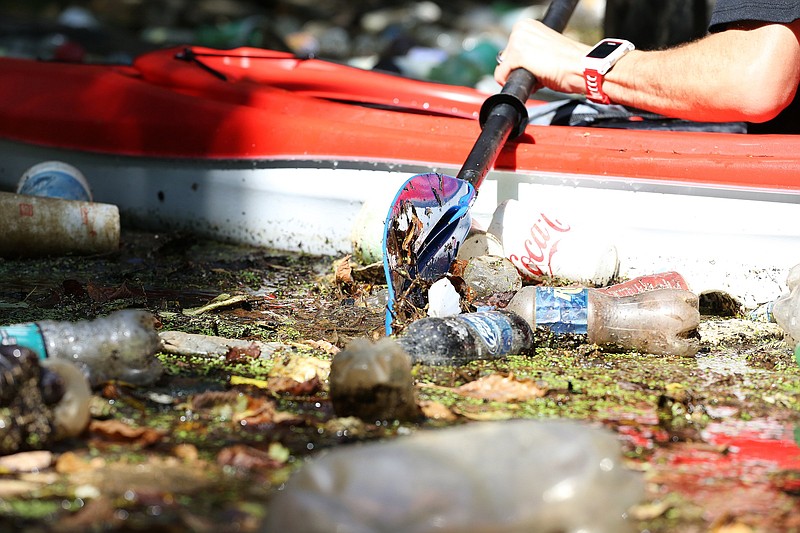A committee vote on a Tennessee bill that would make it illegal for local municipalities to regulate single-use waste, among other items, was postponed until next week as legislators got hung up on an outlying concern from two lobbyists.
House Bill 1021 received support from several members of the House Consumer and Human Resources Committee but was delayed as legislators determined a vote shouldn't take place until additional language could be added to ensure food trucks aren't negatively impacted by the unrelated bill.
"'Food trucks' isn't even in the bill. There's no mention of food trucks," bill sponsor Rep. Susan Lynn, R-Mount Juliet, argued.
Two unnamed lobbyists voiced concern late Monday morning, about two hours before the committee was to vote on the bill, Lynn said.
The argument was that the bill - which would implement statewide standards for auxiliary devices such as bags, cups, bottles, straws, to-go boxes, delivery packaging and more - could hurt food trucks because they are containers that store food.
The committee spent much of the hearing discussing the amendment's merits ensuring one another that food trucks weren't supposed to be impacted by the bill. Meanwhile, Senate sponsor Mike Bell, R-Riceville, worked on changing the language of the Senate bill to ensure such items wouldn't be affected.
Lynn asked the committee to move forward on the vote despite the forthcoming amendment, stating that her Senate colleague was working to clarify the language. However, a House committee member was concerned about leaving the changes up to the Senate.
"God love them, but we're leaving this up to the Senate," Rep. David Hawk, R-Greeneville said.
A five-minute recess was called. Lynn returned and proposed to suspend the bill so the verbiage could be added to the House bill before the committee meets again next week.
Throughout the meeting, legislators scorned lobbyists for bringing forward concerns in the final hours before the committee meeting, stating the bill was readily available for earlier review. However, the bill is attached via an amendment to a totally unrelated bill about district boundary maps. Legislators didn't have the wording finalized before deadline, so they inserted text as a placeholder. They then used amendments in subcommittees and committees to slide in the intended bill, completely replacing the original bill.
The amendment was passed through a subcommittee and approved to be attached to the bill in the consumer and human resources committee. The bill itself was then delayed.
Proponents argue the bill is needed to ensure uniformity statewide. Lynn claimed several times that cities would create a patchwork of confusing bills just to attack businesses if left to deal with the issue themselves.
"I have no issue with taking this away from a local government," she said. "They are just thinking they can do this to business because business is business, and these local businesses are easy targets."
She also twice told an anecdote about her intern coming back from lunch carrying a fountain drink in a Styrofoam cup and a sandwich in plastic packaging sealed by more plastic. She was disheartened to think that some cities were trying reduce such items and called them a necessity.
Representatives from the Memphis and Nashville areas told committee members they would not support the bill. They argued cities should be able to consider such bills at the local level to try to limit pollution. They also tried to assure Lynn their positions weren't to pick on businesses.
"I struggle to understand why you would carry this bill that would essentially take away the ability from large cities that are dealing with this issue," Rep. Bob Freeman, D-Nashville, said.
However, Lynn argued such decisions should be left up to the state, which does not currently have plans to implement such restrictions.
Several fellow members of the committee spoke in support of the bill.
Hawk said he trusts bill-sponsor Lynn and therefore would approve the bill.
"You had me at hello," he said.
Rep. Mike Sparks, R-Smyrna added that he recycles more than anyone else in the committee room, encouraged others to do the same and said he supports the bill.
He does not want to see Tennessee implement the same restrictions against single-use pollutants that others have worldwide.
"I see a lot of nonsense that goes on across the country," he said. "I seen what California done [reducing straw use at restaurants]."
He went on to paraphrase a Proverb about wisdom in the multitude of counselors before citing industries that support the bill - the gas station industry, retail industry, some grocers and business industries. The bill is also supported by the beverage industry.
Contact staff writer Mark Pace at mpace@timesfreepress.com or 423-757-6659. Follow him on Twitter @themarkpace and on Facebook at ChattanoogaOutdoorsTFP.

